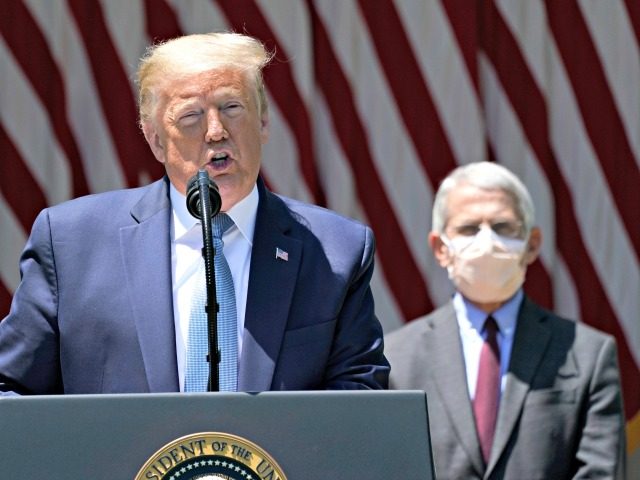Dr. Anthony Fauci defended President Donald Trump from claims Wednesday that he lied about the coronavirus, telling Fox News: “I don’t recall anything that was any gross distortion in things that I spoke to him about.”
On Wednesday, it was revealed that Trump told journalist Bob Woodward that he had downplayed the threat of the coronavirus pandemic to prevent the public from panicking.
Trump admitted on tape to Bob Woodward that he played down the threat of coronavirus. Share this far and wide. #TrumpKnew pic.twitter.com/XAW7TlRzZy
— MeidasTouch.com (@MeidasTouch) September 9, 2020
Trump spoke to Woodward several times, as the latter researched his latest book about the administration, Rage.
The Washington Post went further, saying that Trump had been “intentionally misleading” Americans.
Trump’s rival, former Vice President Joe Biden, made a similar argument on the campaign trail in Michigan on Thursday, telling members of the United Auto Workers that Trump had “lied” about the coronavirus pandemic, calling Trump’s admission “a life and death betrayal of the American people.”
But Fauci, who is the director of the National Institute of Allergy and Infectious Diseases, told Fox News later: “I don’t think [Trump] ever distorted things that I spoke to him about.”
Referring to Trump’s coronavirus press briefings, Fauci said, “I don’t think he said much different than what we said [to him] when we were in the Oval Office.”
In public statements about the coronavirus pandemic, going all the way back to January, Trump took a very optimistic view — arguably, an overly optimistic one.
But he also frequently mentioned the fact that the virus could pose a risk to the country.
On January 30, 2020, for example, Trump told a rally in Des Moines, Iowa (emphasis added):
Hopefully everything’s going to be great. They have somewhat of a problem, but hopefully it’s all going to be great. But, we’re working with China just so you know, and other countries very, very closely, so it doesn’t get out of hand, but it’s something that we have to be very, very careful with, right? We have to be very careful.
He imposed a travel ban on China the next day.
Several days later, Trump addressed a rally in New Hampshire, in much the same way (emphasis added):
I spoke with president Xi and they’re working very, very hard and I think it’s going to all work out fine. Rough stuff, I tell you. Rough, rough stuff, but I think it’s going to work out good. We only have 11 cases and they’re all getting better.
In his State of the Union address, Trump said (emphasis added):
Protecting Americans’ health also means fighting infectious diseases. We are coordinating with the Chinese government and working closely together on the coronavirus outbreak in China. My administration will take all necessary steps to safeguard our citizens from this threat.
Speaker of the House Nancy Pelosi (D-CA) tore up the speech.
In March, Fauci told conservative Mark Levin on Fox News’ Life, Liberty & Levin that Trump’s response to the pandemic had been “impressive,” adding, “I can’t imagine that under any circumstances that anybody could be doing more.”
The question of balancing the need to inform the public and the need to maintain calm is one that policymakers often face when confronting challenges like infectious diseases.
Biden caused panic in 2009 during the H1N1 outbreak when he told Americans to stay away from airplanes and subways. The Obama White House had to walk back Biden’s statements.
Fauci, a member of Trump’s coronavirus task force whom Biden has praised, admitted in June that he downplayed the need for masks early in the pandemic because of concerns that public demand would lead to a shortage of masks for medical workers.
Democrats have long claimed that Trump called coronavirus a “hoax.” However, Trump was not referring to the virus itself, but to the way Democrats were politicizing it.
As left-leaning FactCheck.org concluded: “Trump did use the word ‘hoax’ but his full comments, and subsequent explanation, make clear he was talking about Democratic attacks on his administration’s handling of the outbreak, not the virus itself.”
Joel B. Pollak is Senior Editor-at-Large at Breitbart News and the host of Breitbart News Sunday on Sirius XM Patriot on Sunday evenings from 7 p.m. to 10 p.m. ET (4 p.m. to 7 p.m. PT). His new book, RED NOVEMBER, tells the story of the 2020 Democratic presidential primary from a conservative perspective. He is a winner of the 2018 Robert Novak Journalism Alumni Fellowship. Follow him on Twitter at @joelpollak.

COMMENTS
Please let us know if you're having issues with commenting.